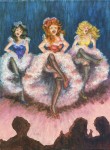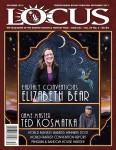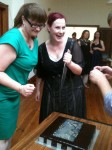 So, the delightful Faren Miller has reviewed Midnight and Moonshine in the latest Locus (which you should totally go and buy) AND Midnight and Moonshine made the Locus Recommended Reading List.
So, the delightful Faren Miller has reviewed Midnight and Moonshine in the latest Locus (which you should totally go and buy) AND Midnight and Moonshine made the Locus Recommended Reading List.
The things we call collections range all the way from gatherings of stories so miscellaneous they may seem to have no more in common than their author’s name to the linked tales also known as ‘‘mosaic novels’’ (though the degree of connection varies). At its best, a collection can show both a distinctive personality and an appealing openness to possibility – narrative as unconventional as an avant-garde novel, but much less liable to tie the reader’s brain in painful knots.
 Midnight and Moonshine by Lisa L. Hannett and Angela Slatter sprang from a single co-written story about witches and flappers in an alternate-’20s Charleston VA, ‘‘Prohibition Blues’’. It appeared in Damnation and Dames, a 2012 anthology, but left the authors haunted by characters and concepts much too big for one tale. They ended up writing another dozen stories (which all debut here), that move from Old Norse times, where humans encounter wrangling immortals, right up to a present day, where the bounds between gods and men have become oddly fluid.
Midnight and Moonshine by Lisa L. Hannett and Angela Slatter sprang from a single co-written story about witches and flappers in an alternate-’20s Charleston VA, ‘‘Prohibition Blues’’. It appeared in Damnation and Dames, a 2012 anthology, but left the authors haunted by characters and concepts much too big for one tale. They ended up writing another dozen stories (which all debut here), that move from Old Norse times, where humans encounter wrangling immortals, right up to a present day, where the bounds between gods and men have become oddly fluid.
The interactions of a raven-goddess who survived Ragnarok with members of the hordes of Fae and mortals, as their varied lifespans intersect with hers, could have inspired a series of epic tomes. Fortunately, Hannett and Slatter preferred to keep things relatively short and free from the confines of any one genre. Aside from the connections between characters and generations, these are tales of many kinds, each playing off its header: bits of old sagas, doggerel, songs, as well as fictional diaries and excerpts from the works of obscure scholars. When these elements come together in ‘‘Prohibition Blues’’, some Nordic names persist among Southerners whose roots go back to France or Africa – each with their own gods, manners of wizardry, and connections to shape-shifting Fae. Cultures meld in a rich gumbo where Loki and Legba are one and the same. And there’s more to come. 
Another kind of combination gives this book its unique tone: however grand the fantasy, passionate the romance, or regally exotic these Fae, their stories inevitably take on some of the gritty frankness, spilled blood, and shit of ordinary human life. After enough of these random encounters, even the most arrogant deity can’t help but change.

